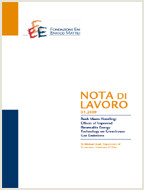Regulatory Independence and Political Interference: Evidence from EU Mixed-Ownership Utilities’ Investment and Debt

08.05.2010
Carlo Cambini, Laura Rondi
G31, G32, L33, L51, L90
Regulated Utilities, Investment, Capital Structure, Private and State Ownership, Regulatory Independence, Government’s Political Orientation
Economy and Society
Fausto Panunzi
This paper examines the investment and financial decisions of a sample of 92 EU regulated utilities, taking into account key institutional features of EU public utilities, such as: a) regulation by agencies with various degrees of independence; b) partial ownership of the state in the regulated firm; and c) the government’s political orientation, which may ultimately influence the regulatory climate to be either more pro-firm or more pro-consumers. Our results show that regulatory independence matters for both investment and financial decisions. Investment increases under an Independent Regulatory Agency (IRA), while ownership has no effect. Leverage also increases when the IRA is in place, especially so if the regulated firm is privately controlled. Finally political orientation does matter, as firm investment increases under more conservative (pro-firm) governments, but this effect appears to revert when the IRA is in place.
